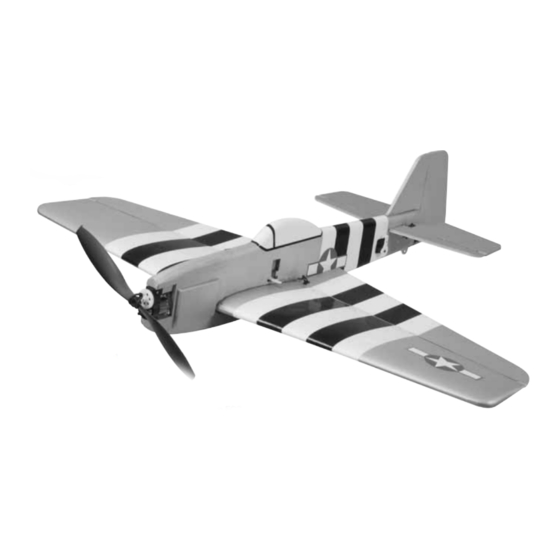GREAT PLANES P-51 MUSTANG Manual de instruções - Página 3
Procurar online ou descarregar pdf Manual de instruções para Modelo de avião GREAT PLANES P-51 MUSTANG. GREAT PLANES P-51 MUSTANG 20 páginas.

PROTECT YOUR MODEL, YOURSELF
& OTHERS...FOLLOW THESE
IMPORTANT SAFETY PRECAUTIONS
1. Your EP P-51 Mustang ARF should not be considered a
toy, but rather a sophisticated, working model that functions
very much like a full-size airplane. Because of its
performance capabilities, the EP P-51 Mustang ARF, if not
assembled and operated correctly, could possibly cause
injury to yourself or spectators and damage to property.
2. You must assemble the model according to the
instructions. Do not alter or modify the model, as doing so
may result in an unsafe or unflyable model. In a few cases
the instructions may differ slightly from the photos. In those
instances the written instructions should be considered
as correct.
3. You must take time to build straight, true and strong.
4. You must use an R/C radio system that is in first-class
condition, and a correctly sized motor and components
(ESC, wheels, etc.) throughout the building process.
5. You must correctly install all R/C and other components so
that the model operates correctly on the ground and in the air.
6. You must check the operation of the model before every
flight to insure that all equipment is operating and that the
model has remained structurally sound. Be sure to check
clevises or other connectors often and replace them if they
show any signs of wear or fatigue.
7. If you are not an experienced pilot or have not flown this
type of model before, we recommend that you get the
assistance of an experienced pilot in your R/C club for your
first flights. If you're not a member of a club, your local hobby
shop has information about clubs in your area whose
membership includes experienced pilots.
8. While this kit has been flight tested to exceed normal use,
if the plane will be used for extremely high-stress flying,
such as racing, or if an motor larger than one in the
recommended range is used, the modeler is responsible for
taking steps to reinforce the high-stress points and/or
substituting hardware more suitable for the increased stress.
We, as the kit manufacturer, provide you with a top quality,
thoroughly tested kit and instructions, but ultimately the
quality and flyability of your finished model depends on
how you build it; therefore, we cannot in any way
guarantee the performance of your completed model, and
no representations are expressed or implied as to the
performance or safety of your completed model.
Remember: Take your time and follow the instructions to
end up with a well-built model that is straight and true.
LITHIUM BATTERY HANDLING & USAGE
WARNING!! Failure to follow all instructions could cause
permanent damage to the battery and its surroundings, and
cause bodily harm!
• ONLY use a LiPo approved charger. NEVER use a
NiCd/NiMH peak charger!
• NEVER charge in excess of 4.20V per cell.
• ONLY charge through the "charge" lead. NEVER charge
through the "discharge" lead.
• NEVER charge at currents greater than 1C.
• ALWAYS set charger's output volts to match battery volts.
• ALWAYS charge in a fireproof location.
• NEVER trickle charge.
• NEVER allow the battery temperature to exceed
50°F (65°C).
• NEVER disassemble or modify pack wiring in any way or
puncture cells.
• NEVER discharge below 2.5V per cell.
• NEVER place on combustible materials or leave
unattended during charge or discharge.
• ALWAYS KEEP OUT OF REACH OF CHILDREN.
DECISIONS YOU MUST MAKE
In the hands of a capable pilot the EP P-51 Mustang ARF is
an impressive 3D performer. But for the EP P-51 Mustang ARF
to perform to its full potential, it must be properly equipped with
all the right gear (servos, batteries, receiver, and speed
control). There may be more than one type and brand of radio
equipment that can be used, but based on extensive testing,
following is the equipment we recommend so you can get the
most performance out of your EP P-51 Mustang ARF and
assemble it as shown in this instruction manual.
Transmitter
With a standard, four-channel radio the EP P-51 Mustang
ARF is capable of all the basic 3D maneuvers. However,
some advanced pilots who are already familiar with handling
"foamies" may prefer to fly the EP P-51 Mustang ARF with a
computer radio capable of endpoint adjustments (for fine-
tuning control throws), exponentials (for "softening" the
throws near the center of the travel), and various mixing
functions (such as rudder-to-elevator mixing for extended
knife-edge flight).
The EP P-51 Mustang ARF requires three micro servos with
a minimum torque rating of 15 oz-in. Futaba
servos (FUTM0042) are ideal because they meet the torque
and weight requirements. Although there may be other
3
Servos
®
S-3108 micro
